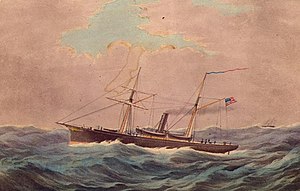USS Monticello (1859)

Colored print of 1860s vintage
|
|
| History | |
|---|---|
|
|
|
| Name: | USS Monticello |
| Namesake: | Monticello |
| Laid down: | 1859 |
| Acquired: | by purchase, 12 September 1861 |
| Decommissioned: | 24 July 1865 |
| Fate: | Sold into merchant service, 1 November 1865 |
| General characteristics | |
| Type: | Steamer |
| Displacement: | 655 long tons (666 t) |
| Length: | 180 ft (55 m) |
| Beam: | 29 ft (8.8 m) |
| Draft: | 12 ft 10 in (3.91 m) |
| Propulsion: |
|
| Speed: | 11.5 kn (13.2 mph; 21.3 km/h) |
| Armament: | 1 × 9 in (230 mm) gun, 2 × 32-pounder guns |
The first USS Monticello was a wooden screw-steamer in the Union Navy during the American Civil War. She was named for the home of Thomas Jefferson. She was briefly named Star in May 1861.
Monticello was built at Mystic, Connecticut, in 1859; chartered by the Navy in May 1861; and purchased on 12 September 1861 at New York from H. P. Cromwell & Company, for service in the Atlantic Blockading Squadron, Captain Henry Eagle in command.
Monticello was renamed Star on 3 May 1861, but resumed her original name on 23 May. Seeing immediate action, Monticello relieved USS Baltimore in blockading the James River and preventing communication with the Elizabeth River on 2 May, then relieved USS Quaker City at Cape Henry on the 8th. She engaged the batteries at Sewell's Point from 10–14 May, then continued blockade duty until steaming up the Rappahannock to Smith's Island on 24 June. Operating with the Army on the James River above Newport News, Virginia on 5 July, she dispersed a body of Confederate cavalry. Often engaging Confederate batteries through the remainder of 1861, she was in the squadron that captured the batteries at Hatteras Inlet on 28–29 August in the first significant Union victory, one which greatly encouraged the North. She drove off Confederates attacking Union soldiers in that area on 5 October.
...
Wikipedia
